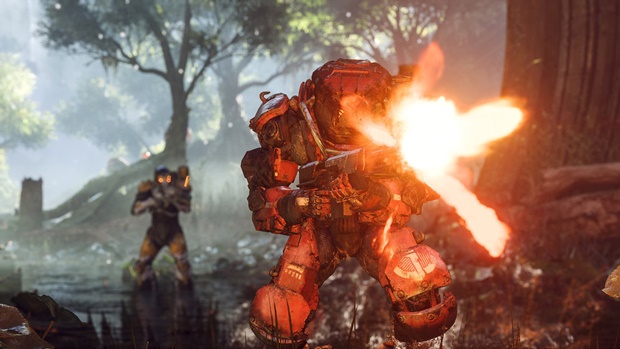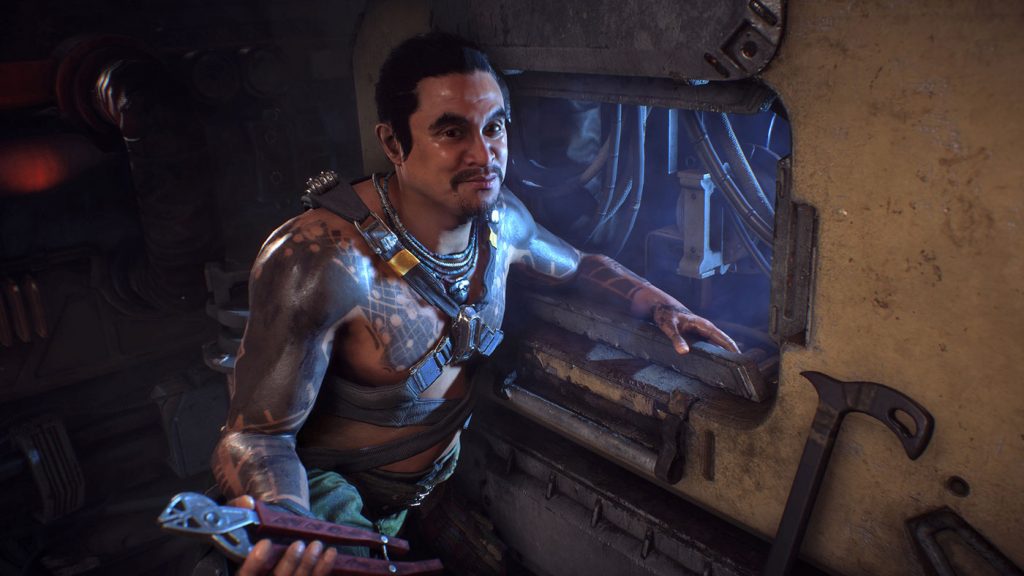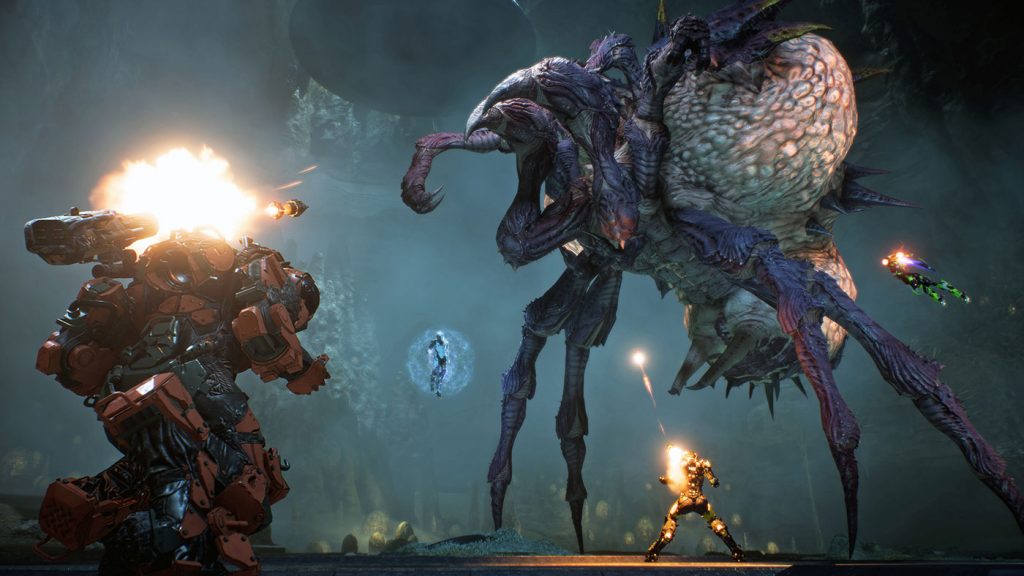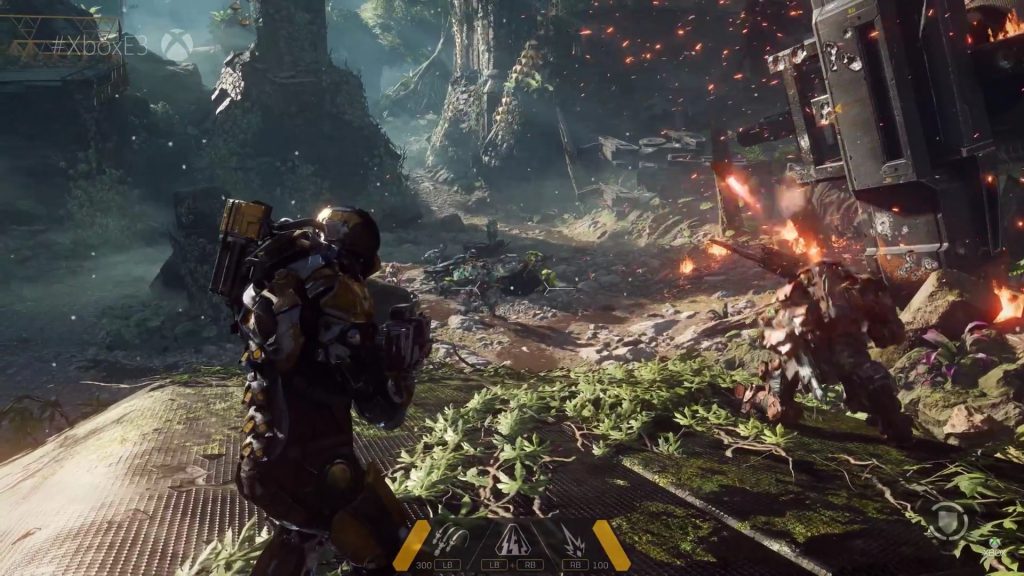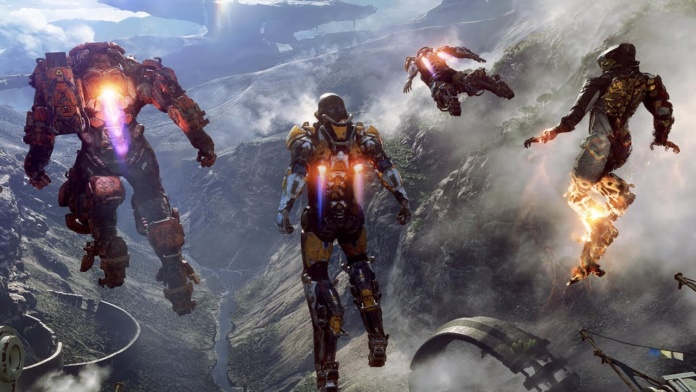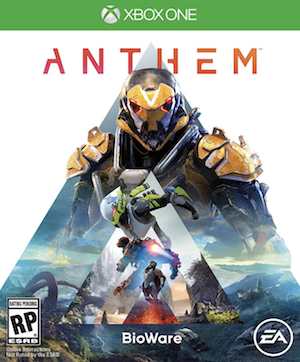
Anthem opens with a bang. You’re a rookie Freelancer, a bounty hunter who pilots an Iron Man-esque suit of power armor known as a Javelin, and you’ve been thrown into your first assignment: taking down a Cataclysm. See, the world of Anthem was built by the Shapers, who used something known as The Anthem of Creation to, well, create the world. But they disappeared, their work unfinished, leaving their relics, and the Anthem, behind. Thing is, without the Shapers there to control it, the Anthem is… unstable. And when the Anthem gets unstable, it starts to break things. Violently. These moments are called Cataclysms, and as a Freelancer, it’s your job to stop them. This new Cataclysm is called the Heart of Rage, and your team – and several other teams of Freelancers – need to stop it.
It’s a great opening mission. It introduces some great characters, has a good amount of enemy variety, gives you control of a Javelin with a fun loadout, and establishes the sheer joy of piloting it. It gives you what you want out a BioWare game: characters that are immediately interesting and worth caring about, and enormous narrative stakes. It also shows off Anthem’s graphical prowess. You lose, of course. The odds are unbeatable. A lot of people die. This is a BioWare game, after all. In the beginning, a lot of people always die.
"The Javelin is easily Anthem’s greatest accomplishment. Part power armor, part mech, it’s all awesome. See, Javelins can fly. Press a button and you’re up, up, and away, and it feels glorious."
Fast forward two years. The Freelancers are scattered, broken, and hated, which doesn’t make a lot of sense considering they died trying to save people’s lives, but that’s where we are. Humanity hides behind walls to protect itself from Cataclysms and the monsters spawned by the Anthem, which has grown more volatile without Freelancers to keep it in check. You are one of the last Freelancers. Based out of Fort Tarsis, you take the jobs you can still get, but times are lean. Nobody trusts Freelancers anymore. Until, of course, something happens, and you’re needed again.
Being needed involves the same thing as pretty much every other looter shooter. You get missions from the game hub, enter the world, kill a bunch of bad guys, get loot, head back to the hub, rinse and repeat. Anthem spices that formula up by adding BioWare’s patented narrative style and character interactions, and with the Javelin.
The Javelin is easily Anthem’s greatest accomplishment. Part power armor, part mech, it’s all awesome. See, Javelins can fly. Press a button and you’re up, up, and away, and it feels glorious. Everything about it, from the sheer visual style to the whoosh of your boosters igniting, perfectly sells the fantasy of flight. The initial speed once you’re airbourne is fairly unimpressive, but once you speed up, whoa buddy. Even at top speed, your Javelin is easy to control, and the amount of verticality it adds to any space is incredible. Don’t want to be on the ground? Don’t be. The best part is that the gameplay feedback from flying in the Javelin – the jump of the boosters, the whoosh and speed of the thrusters, the sound of the wind, the crunch as you land – never gets old. The fact that some Javelins have air dashes and barrel rolls is just an added bonus.
" As you advance, you gain access to character’s with interesting stories, almost all of whom are beautifully animated."
So a looter shooter with exceptional traversal systems and BioWare’s trademark storytelling. Doesn’t sound too bad, huh? If only. It doesn’t take long for Anthem’s cracks to show. Fort Tarsis is a neat zone once you unlock most of its areas, but it starts off as a couple hallways connected by a staircase, which isn’t very interesting. What’s worse is that you traverse it in first-person, at a slow walk, so you can find the NPCs who will give you quests. After you’ve hoofed it to wherever that NPC is and had said conversation, you have to slog back to your Javelin to begin the mission.
This wouldn’t be so bad if these conversations were interesting, but the fact of the matter is that the first few hours after the game’s opening are a slog. Most of the characters you’ll interact with are boring, with the exception of Owen, your partner who runs things back at Fort Tarsis, and many of the missions they’ll send you on are equally dull. If you’re hoping for BioWare’s trademark dialogue system to help you out here, you’re out of luck. The dialogue wheel from Mass Effect is nowhere to be seen. Instead, you’re presented with two options, neither of which do much more than give the conversations some additional flavor. Mostly, these characters just throw a lot of proper nouns at you and try to set up the better stuff, which comes later.
And the better stuff does come. As you advance, you gain access to character’s with interesting stories, almost all of whom are beautifully animated. There’s Yarrow, a retired Freelancer whose desire to make sure that every Freelancer’s story is recorded on the Great Wall is driven by immense personal loss; Brin, a nervous, by-the-book Sentinel (they guard Tarsis’s walls) who is reluctant to interact with Freelancers, but knows she needs your help; Matthias, a brilliant, neurotic Arcanist who talks too fast and is trying to uncover the mysteries of the Shapers; and Owen himself, whose incredible skill as a Cypher (like I said, a lot of proper nouns) is matched only by his desire to join his partner and best friend (you) as a Freelancer and a sad, lonely past. There are others, too, of course. I don’t want to spoil them, but when Anthem’s characters open up – when BioWare is allowed to be BioWare – they work, and you care about them. Fort Tarsis itself never gets too much better – it feels incredible artificial; a collection of people standing around, waiting to be interacted with, trying to look natural and largely failing – but BioWare’s storytelling chops are intact. There’s also a character whose major job seems to be to convince you to spend money on in-game purchases to upgrade your Javelin’s looks. These cosmetic upgrades can be purchased with both in-game currency and real money, but I’m sure this is just a coincidence.
"You can’t alter anything about your current setup – the people in your party, what Javelin you’re using, the gear on that Javelin, what mission you would like to play, or even look at your loot – without going back to Fort Tarsis"
Once you’re done hanging out in the hub, you can head out on a mission, which means walking back to your Javelin. You can play alone, with friends, or with a matchmade group. Once you’ve selected what you want to do, you’re sent out into the world. And this is where Anthem’s real issue comes in: its loading screens. Loading screens are frequent, and they take a very long time – anywhere from thirty second to several minutes – and there is currently a bug that can trigger infinite loading screens. EA and BioWare have promised to fix this in an upcoming patch, but whether that will actually happen is another matter. The larger problem, aside from the fact that a loading screen lasts so long that you could go make a sandwich, eat that sandwich, come back, and still have to wait, is that the “here’s your mission objective” or “here’s some more plot” stuff that open each mission starts as soon as the first person loads in. If you’re not that person, that means you’ll miss most of it, and there’s no way to go back.
Sometimes you’ll load so slowly that your squad will be far ahead of you. At this point, the game will inform you that you are too far behind, and if you don’t catch up within an allotted amount of time, it will teleport you to them which triggers, you guessed it, another loading screen. It is possible to spend the entire mission jumping from loading screen to loading screen as the game attempts to get you where it thinks you need to be. Any dialogue, moments, or story revelations that occur during these loading screens are lost forever. What’s more, what constitutes being “too far away” is incredibly arbitrary. I’ve had missions where I could see the leader of my party flying ahead of me, and been informed that I was still too far away. No matter what you do, you’ll likely see this screen several times. It does not get less annoying.
Once you’re in the world, you won’t have to load again unless you’re underground or zoning into a new area, which is rare. The downside is that you can’t alter anything about your current setup – the people in your party, what Javelin you’re using, the gear on that Javelin, what mission you would like to play, or even look at your loot – without going back to Fort Tarsis, which requires (shocker) another loading screen. If you’d like to change your gear, you’ll have to be at the Forge, inside Fort Tarsis, which requires a loading screen of its own. You cannot change your gear without being at the Forge, nor can you look at what gear you have collected without returning home.
"As rote as these missions are, they wouldn’t be so bad if the enemies you fought were interesting. They aren’t. Most of them are merely braindead gunts that spawn in large numbers and shoot at you."
To give you an idea of how absolutely maddening this is, let me run you through how many times you will load in a given mission. Load into mission. If you’re lucky and you load in on time, you’ll play the mission normally. If you’re not, you’ll bounce from loading screen to loading screen until the game decides you’ve caught up. Finish mission. Loading screen. Mission results screen, which shows XP and earned gear. Note that you cannot equip new gear here. Choose whether to go back to the Forge or Fort Tarsis. Let’s assume you go to the Forge to equip your new gear. Loading screen. Equip your new gear. Loading screen. Walk slowly around Fort Tarsis so you can get your next quest. Walk back to your Javelin. Loading screen. Choose your mission and squad. Loading screen. Repeat ad infinitum. Please remember that these loading screens can last anywhere from a few seconds to several minutes or forever, requiring you to close the game and reopen it. Sometimes, you may have to restart your computer so the game will run properly again. Have fun!
And then there’s the missions themselves. There are three types: 1. Fly to an area and kill all of the waves of enemies that spawn. You may or may not have to fly to more areas and kill more waves afterwards. Usually you will. Repeat until the game has decided you’re done; 2. Fly to an area and defend a certain object. This involves standing inside a glowing circle and killing everything around you until a meter fills up and you’re done; and 3. Fly to an area, find a bunch of glowing orbs, take them to a certain place. You may also match runes to other runes on a wall to solve a puzzle. Seen all three? Congratulations, you’ve seen every single mission design in Anthem. Sound familiar?
As rote as these missions are, they wouldn’t be so bad if the enemies you fought were interesting. They aren’t. Most of them are merely braindead gunts that spawn in large numbers and shoot at you. Sure, there’s a few that float in the air and a couple of bigger guys with shields, but that’s really about it. You could turn up the difficulty, but like most games in this genre, Anthem’s idea of difficulty is giving the enemies substantially more health and making them better shots. Yawn. Your best bet is to equip something that causes a really big explosion and throw it at large groups, then mop up the survivors with your weapons and special abilities. There’s no incentive to use the verticality your Javelin offers, because no enemies require it, and even if you do decide to hover in place and shoot from the air, it doesn’t change the core combat all that much.
This is a shame, because the game’s classes, represented by different Javelins, are a lot of fun to play. You start with one Javelin, but you can unlock more as you level up. While guns are (largely) equippable across classes, Javelin abilities beyond each class’ core functions are based on gear. Since you can only get gear for that Javelin while you’re playing with it, switching suits essentially reverts you to square one.
The Storm is probably the best of the four. It can fly the longest without overheating, gets an extra shield when it hovers in place, and all of its attacks are elemental magics that have enormous range and do ridiculous damage. A Storm Javelin, by itself, can pretty much wipe out a battlefield of enemies. Still, the others are a lot of fun. The Ranger is an all-arounder with rocket and grenade launchers, and the ability to double jump and barrel roll; the Colossus is a slow, lumbering monstrosity with an enormous health pool, a physical shield, and its own special class of machine guns; and the Interceptor is a fast, agile close combat unit with cool melee attacks. Each comes with its own ultimate ability – the Ranger, who I spent the most time with, shoots a barrage of missiles.
Unfortunately, the guns don’t fare as well. Each class of gun feels good to use, but they all also feel the same. Nothing distinguishes them visually; they all look like variants of each other, and they don’t have the abilities or perks that the guns in a game like Destiny do. They’re standard issue, military-esque weapons that lack an identity. They’re fine, but that’s all.
" Just as the missions start to get interesting, just after the plot gets moving, after your meet some cool characters and get introduced to the main villain, who is legitimately intimidating, the game gives you a mission to unlock several old tombs. No problem, right? Except that opening these tombs requires you to complete several arbitrary tasks."
The other issue is that none of the missions or enemies take advantage of these differences between Javeins. Most of your enemies chill on the ground, and there’s nothing about any particular Javelin that makes them harder or easier to fight. It’s really just personal preference, and it’s a shame that Anthem doesn’t use its verticality or unique systems to challenge you or your choice of Javelin. Some missions take away your ability to fly, but that doesn’t make the game more interesting. The game does have a combo system, in which using two abilities in succession leads to huge damage.
Having a Storm freeze an enemy, and then having another enemy melee that enemy will cause them to shatter. You might also combine attacks that have other elements – fire, lightning, poison, etc – to create combos. The issue is these things usually require coordination and planning beforehand – remember, you can’t switch your gear on the fly – and it’s nearly impossible to pull off with a random group and impossible solo. The game also doesn’t tell you that you can do it, or what mechanics can be combined. It, along with other tutorials, emails, lore information, and several other interesting things, are buried in a menu you have no reason to access because it is separate from the one in the Forge.
Which brings me to my main complaint about Anthem. Just as the missions start to get interesting, just after the plot gets moving, after your meet some cool characters and get introduced to the main villain, who is legitimately intimidating, the game gives you a mission to unlock several old tombs. No problem, right? Except that opening these tombs requires you to complete several arbitrary tasks. These could be any number of things, from killing a certain number of enemies with melee attacks to reviving a certain number of squadmates, performing a certain number of combos, completing a certain number of world events, etc. This brings the story, which is at a very compelling point, to a dead stop to artificially extend the game. Worse, some of these requirements are built on requiring members of your squad to fail (revive a certain number of squadmates) or on mechanics the game never teaches you about (using combos).
"There’s mounds of untapped potential here. It just needs work. Serious work, to fix the game’s core problems before BioWare begins the ceaseless content drip that defines games like this."
And that’s Anthem’s problem, really. The good bits area really good. Flying, the combat, exploring the world, interacting with the characters. But then you have the loading screens. The forced walking in Fort Tarsis. The rote missions. The fact that you can’t change your weapons or gear on the fly. The “you’re too far away” notices. The samey enemies. And the multiple minor visual bugs that occur frequently. None of them are gamebreaking, mind, but they’re another small blemish on a game that already has deep, systemic flaws. BioWare can patch the loading times and the tomb quests, which they have already said they would do, but the flaws in Anthem’s enemies and missions are a core part of its structure, and they’re not likely to be redesigned. Similarly, the fact that you have to enter a loading screen to change your equipment, or that the combo system isn’t explained, or that the Tomb quests exist at all, or that the game starts delivering dialogue before all players are loaded in, or that you can be too far away from your squad…
That’s not to say that Anthem is unsalvageable. I think it can be saved, and I hoped that it will be. Because the good stuff is really good. There’s mounds of untapped potential here. It just needs work. Serious work, to fix the game’s core problems before BioWare begins the ceaseless content drip that defines games like this. That shouldn’t be their focus now. Getting this right should be. Right now, Anthem is the music of creation that inspired its name. Left alone, it’s unstable, flawed. But with the right hand to shape it, it could be something wonderful.
This game was reviewed on the PC.
Javelins are awesome. Guns feel good. Good characters. Interesting story and world. Flying is magnificent.
Rote mission design. Little enemy variety. The first few hours are a bore. Content-gating to artificially pad the game. Numerous visual bugs. Loading screens are everywhere and they're long. Little variety in weapon types and loot. You have to be at the fort to equip things. Walking around the fort is slow. The game will try to teleport you if it thinks you are too far away.









